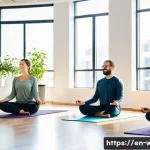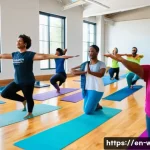Hey wellness enthusiasts! It’s me, your go-to for all things thriving, and if you’re anything like me, you’re driven by a passion to help others live their absolute best lives.
Becoming a certified Wellness Coordinator is an incredible path, especially with the industry booming and a real shift towards personalized, holistic well-being.
But let’s be honest, wrapping your head around all that essential theory for your exams can feel like a monumental task, right? I’ve definitely navigated those challenging waters myself, wondering how to make complex concepts truly stick.
That’s why I’m thrilled to share my tried-and-true study hacks that helped me not just conquer the coursework, but genuinely build a deeper understanding of wellness principles.
Ready to transform your study sessions and ace those exams with confidence? Let’s dive in and unlock the secrets to mastering Wellness Coordinator theory together!
Decoding the Core Concepts: My Secret to Understanding, Not Just Memorizing

Breaking Down Complex Jargon
I remember feeling completely overwhelmed when I first started diving into the dense textbooks for my Wellness Coordinator certification. It felt like every other word was a new piece of scientific jargon or a complex theoretical framework that just wouldn’t stick. What worked wonders for me was a simple trick: breaking down those intimidating terms into their root words and looking for everyday analogies. For example, instead of just memorizing the definition of “homeostasis,” I’d think about how my body regulates its temperature like a thermostat in my house. Or when learning about different dietary approaches, I wouldn’t just read the guidelines; I’d picture how these plans might look on a grocery list for a client I might one day work with. This isn’t just about simplification; it’s about making those abstract concepts tangible and personal. It truly transformed my learning from a chore into an exciting discovery process, giving me a solid foundation for more advanced topics later on. Trust me, finding those personal connections makes all the difference in truly grasping the material.
The Power of Real-World Connections
Beyond breaking down individual words, I found immense value in connecting theoretical knowledge to practical scenarios. Our future clients won’t be living in textbooks, right? So, neither should our learning. When studying stress management techniques, I wouldn’t just learn about “mindfulness meditation” in theory; I’d actually try a 5-minute guided meditation myself or think about how I could explain its benefits to a busy working parent. For nutritional guidelines, I’d imagine a client struggling with meal prep and consider how the principles of balanced macros or portion control could simplify their life. This practical application helped me see the ‘why’ behind the ‘what,’ solidifying the information in a way that rote memorization never could. It’s about moving beyond just knowing the facts to understanding how they apply in the messy, beautiful reality of people’s lives. This approach also made me feel more confident in my future role, knowing I wasn’t just spouting theory but genuinely understanding its impact.
Crafting Your Personalized Study Sanctuary
Finding Your Flow: The Ideal Environment
Let’s be real, trying to study for something as important as your Wellness Coordinator exams in a chaotic environment is a recipe for disaster. I learned this the hard way! For me, finding my “flow” meant creating a dedicated space free from distractions. This isn’t necessarily about having a fancy home office; it could be a quiet corner of your living room, a local library, or even a specific coffee shop with a calm vibe. The key is consistency. I always made sure my space was tidy, well-lit, and had all my study essentials within reach—my notes, highlighters, water bottle, and a healthy snack. Experiment with what works for you. Some people thrive with background music; others need absolute silence. I personally found instrumental music helped me focus without being distracting. The goal is to minimize external interruptions so your brain can fully engage with the material, allowing for deeper absorption and understanding. It’s about setting yourself up for success before you even open a book.
Tools of the Trade: Apps and Resources I Swear By
In this digital age, we’re spoiled for choice when it comes to study aids, and I’ve tried a ton of them! While nothing replaces good old-fashioned textbook reading, certain tools significantly streamlined my learning process. Flashcard apps like Anki or Quizlet were absolute lifesavers for active recall, especially for those tricky anatomical terms or specific nutritional values. I also found incredible value in educational podcasts that broke down complex health topics into digestible chunks, perfect for listening during my commute or while doing chores. And honestly, simply utilizing a digital calendar to schedule my study blocks and set reminders was a game-changer for staying organized. Don’t underestimate the power of these supplementary resources to reinforce your learning and keep you engaged. Here’s a quick look at some general categories of tools that really upped my study game:
| Category | Description & How I Used It |
|---|---|
| Flashcard Apps (e.g., Anki, Quizlet) | Perfect for memorizing definitions, terms, and key facts. I used them daily for quick review sessions. |
| Study Planners/Calendars | Crucial for scheduling study blocks, tracking progress, and setting realistic goals. Digital ones made it easy to adjust on the fly. |
| Educational Podcasts/Videos | Great for auditory learners or for getting different perspectives on complex topics. I’d listen to them during breaks or commutes. |
| Note-Taking Apps (e.g., Evernote, OneNote) | Helped me organize my thoughts, create summaries, and access my notes across devices. |
| Mind Mapping Software | Excellent for visualizing connections between different concepts and seeing the ‘big picture’ of complex topics. |
Experiment with what resonates with you, but don’t feel pressured to use everything. Finding just a few tools that genuinely enhance your personal learning style can make a monumental difference.
Active Recall: The Game-Changer for Long-Term Retention
Flashcards Aren’t Just for Kids Anymore
When I first heard about “active recall,” I admit, I was a bit skeptical. It sounded like just another academic buzzword. But oh, how wrong I was! This method completely transformed how I retained information. Instead of passively re-reading my notes (which, let’s face it, often just makes you feel like you know something when you don’t), active recall forces your brain to retrieve information from scratch. My absolute favorite way to implement this was with flashcards, both physical and digital. I’d write a question on one side and the answer on the other, or a term on one side and its definition on the reverse. The act of trying to recall the answer *before* flipping the card is where the magic happens. Even if I got it wrong, the effort of trying solidified the correct answer when I finally saw it. It’s like a mini-workout for your brain, strengthening those neural pathways. I personally found that using different colored cards for different subjects helped keep things organized and visually engaging.
Teach it to Learn it: Explaining Concepts Aloud
This might sound a little quirky, but hear me out: one of the most effective active recall techniques I used was pretending to teach the material to an imaginary student (or, on occasion, my very patient houseplant!). When you have to explain a concept in your own words, simplifying it enough for someone else to understand, you quickly uncover any gaps in your own knowledge. You can’t waffle or use vague terms; you have to articulate it clearly and concisely. I’d walk around my apartment, explaining the intricacies of the endocrine system or the benefits of macronutrient timing as if I were giving a lecture. It forces you to process the information on a deeper level, to connect the dots, and to structure your understanding logically. This method not only boosted my confidence but also highlighted areas where I needed to go back and review. It’s truly a test of whether you *understand* the material or just *recognize* it.
The Buddy
Study Groups That Actually Work
For some, the idea of a study group conjures images of endless chit-chat and minimal actual studying. I totally get that skepticism! I’ve been in those groups. But I’ve also been in study groups that were absolute game-changers, and the difference lies in structure and intention. What worked for me and my peers was setting clear agendas for each session. We’d assign different topics to each member to briefly “teach” to the others, followed by open discussion and Q&A. This ensured everyone came prepared and actively participated. We’d also challenge each other with practice questions, debate different perspectives on wellness approaches, and even quiz each other spontaneously. The beauty of a well-functioning study group is the shared accountability and the diverse insights each person brings. Sometimes, hearing a concept explained in a slightly different way by a peer can make it click instantly. It’s about leveraging collective brainpower to conquer those challenging subjects together.
Peer Teaching: A Two-Way Street to Mastery

Building on the study group concept, actively engaging in peer teaching was a breakthrough for me. It’s one thing to understand a topic for yourself, but it’s another entirely to explain it clearly and accurately to someone else. I remember preparing to explain the nuances of behavioral change models to a friend in my program; just the act of structuring my thoughts, anticipating their questions, and simplifying complex ideas made my own understanding incredibly robust. And the amazing part? They’d often ask questions I hadn’t even considered, pushing me to think more deeply. Then, when it was my turn to learn from them, I’d get a fresh perspective on a topic I might have been struggling with, like specific dietary supplements or exercise physiology. This reciprocal learning environment not only solidified my knowledge but also boosted my confidence in my ability to articulate complex wellness principles, which is invaluable for a future Wellness Coordinator. It’s a genuine win-win situation for everyone involved!
Nourishing Your Brain and Body Through the Grind
Fueling Your Focus: Smart Snacking and Hydration
Okay, let’s be honest, those all-night study sessions fueled by sugary drinks and chips? Been there, done that, and regretted it deeply! I quickly realized that my brain, much like a high-performance engine, needs the right fuel to operate optimally. Ditching the processed junk and opting for nutrient-dense snacks made a world of difference in my concentration levels and energy. Think walnuts, blueberries, Greek yogurt, or a crunchy apple with a dollop of peanut butter. These aren’t just tasty; they provide sustained energy and brain-boosting nutrients that keep you sharp without the inevitable sugar crash. And hydration? Absolutely non-negotiable! I made it a point to keep a large water bottle at my desk and refill it constantly. Dehydration can sneak up on you, leading to headaches and fatigue that completely derail your study efforts. Investing a little time in conscious fueling will pay dividends in your study efficiency and overall well-being. It’s amazing how much better you can perform when you truly nourish your body.
Mindful Movement: Short Breaks, Big Impact
Sitting hunched over books for hours on end might feel productive, but it’s actually counterproductive. Your brain needs breaks, and your body needs to move! I personally found that incorporating short, mindful movement breaks every hour or so completely revitalized my focus. This wasn’t about hitting the gym for an intense workout (though that’s great too!); it was about simple acts like stretching, walking around the block, doing a few jumping jacks, or even just some deep breathing exercises. These brief interludes not only boost circulation and reduce muscle stiffness but also give your mind a chance to reset, preventing burnout and improving information retention. I remember feeling stuck on a particularly challenging concept, taking a 10-minute walk outside, and returning to my desk with a fresh perspective and a sudden “aha!” moment. Don’t underestimate the power of these micro-breaks to enhance both your physical comfort and your mental clarity.
Mock Exams and Mindset: Conquering Test Day Jitters
Simulating Success: Practice Makes Perfect
The thought of the actual certification exam can be daunting, right? I know I used to get a knot in my stomach just thinking about it. That’s why mock exams became my secret weapon. They’re not just about testing your knowledge; they’re about familiarizing yourself with the format, timing, and pressure of the real thing. I’d set aside dedicated time, mimicking the actual exam conditions as closely as possible—no notes, no distractions, strict time limits. Afterwards, I wouldn’t just look at the score; I’d meticulously review every single question, especially the ones I got wrong. Understanding *why* I made a mistake was more valuable than just knowing the correct answer. Was it a knowledge gap? A misinterpretation of the question? A timing issue? This detailed analysis helped me pinpoint my weak areas and refine my study strategy, so I wasn’t just guessing on test day but approaching it with genuine confidence. It’s about building that muscle memory for success.
The Unseen Edge: Cultivating a Positive Outlook
Beyond all the study techniques and resources, I truly believe that cultivating a positive mindset was the unseen edge that helped me ace my exams. It’s easy to get caught up in self-doubt, especially when facing a challenging curriculum. But I made a conscious effort to reframe negative thoughts. Instead of thinking, “I’m going to fail this,” I’d tell myself, “I’ve put in the work, and I’m prepared to do my best.” Visualization was also incredibly powerful for me. I’d take a few moments each day to vividly imagine myself confidently answering questions, feeling calm and focused during the exam, and ultimately celebrating my success. This isn’t just wishful thinking; it’s about priming your brain for success and reducing the anxiety that can otherwise sabotage your performance. Remember, your mental game is just as important as your knowledge base. Believe in your preparation, trust your abilities, and walk into that exam room knowing you’ve done everything you can to succeed. You’ve got this!
Closing Thoughts
So there you have it, friends – my personal playbook for not just surviving, but truly thriving through the intense journey of certification. It’s more than just hitting the books; it’s about building a robust learning ecosystem that supports your mind, body, and spirit. Remember, every challenge you face is just another opportunity to deepen your understanding and strengthen your resolve. You’re not just studying for an exam; you’re building the foundation for a career where you’ll genuinely make a difference in people’s lives. Keep pushing forward with curiosity and kindness for yourself, and watch how everything falls into place.
Useful Information to Know
1. Beyond your studies, don’t underestimate the power of connecting with other wellness professionals. Attending industry webinars, joining professional online forums, or even volunteering for local health initiatives can open doors you never knew existed. I’ve personally found that some of the most insightful tips and even job opportunities came from conversations with peers and mentors who were just a few steps ahead of me. Building these relationships isn’t just about ‘getting ahead’; it’s about fostering a community where you can learn, share, and grow together, creating a strong support system for your future career. Remember, your network is truly your net worth in this dynamic field, offering perspectives that no textbook can provide and keeping you abreast of the latest trends and best practices.
2. The wellness industry is constantly evolving, with new research, methodologies, and technologies emerging all the time. Earning your certification is a fantastic start, but it’s just that – a start. Make a commitment to lifelong learning. Subscribe to reputable journals, follow leading experts on social media, consider advanced certifications, or attend specialized workshops. I’ve always seen this not as a burden, but as an exciting opportunity to continually refine my skills and offer the best possible support to my clients. Staying curious and updated ensures you remain relevant, credible, and truly an expert in your field, capable of adapting to new challenges and client needs.
3. Once you’re certified and starting your practice, efficient client management becomes paramount. Explore CRM (Customer Relationship Management) software designed for health and wellness professionals. Tools like Acuity Scheduling, Practice Better, or even robust Notion setups can streamline appointment booking, client intake forms, progress tracking, and secure communication. I can’t tell you how much time and mental energy these platforms saved me, allowing me to focus more on actually helping people rather than getting bogged down in administrative tasks. Investing in a good system early on is a game-changer for scalability and client satisfaction, ultimately impacting your bottom line and reputation.
4. This might sound obvious for a Wellness Coordinator, but it’s surprisingly easy to neglect your own health when you’re busy supporting others. Remember, you can’t pour from an empty cup. Schedule your own workouts, prioritize nutritious meals, get enough sleep, and practice the stress management techniques you’ll be teaching your clients. I learned early on that when I wasn’t feeling my best, my ability to show up fully for my clients diminished. Leading by example isn’t just a cliché; it builds trust and authenticity with the people you serve. Your personal well-being is not a luxury; it’s a professional necessity, ensuring you have the energy and clarity to excel.
5. The wellness landscape is vast, and while it’s tempting to try and serve everyone, clarity on your niche will make all the difference. Are you passionate about corporate wellness, nutrition for athletes, stress reduction for busy parents, or senior fitness? Identifying your ideal client allows you to tailor your marketing, develop specialized programs, and communicate your value more effectively. I spent some time really drilling down on who I felt I could genuinely help the most, and it completely transformed my ability to connect with potential clients and build a thriving practice. A focused approach often leads to greater impact and sustainable growth in the long run.
Key Takeaways
To wrap things up, remember that true mastery comes from active engagement, not passive consumption. Break down complex ideas, connect them to the real world, and teach them to solidify your understanding. Cultivate a study environment that fuels your focus, leverage smart tools, and never underestimate the power of peer learning. Most importantly, nurture your own well-being through smart choices and mindful movement, and approach exam day with a positive, prepared mindset. Your journey to becoming a Wellness Coordinator is an exciting one, filled with growth and impact – embrace every step!
Frequently Asked Questions (FAQ) 📖
Q: How do I actually get complex wellness theories to stick in my brain, especially when there’s so much to learn for the exam?
A: Oh, I totally get this! When I was first diving deep into all the essential theories for my Wellness Coordinator certification, I remember feeling completely overwhelmed.
It felt like trying to drink from a firehose! What truly made a difference for me was moving beyond just reading and hoping it would sink in. I started actively engaging with the material.
First, active recall became my best friend. Instead of passively re-reading notes, I’d quiz myself constantly. I’d cover a section, then try to explain it out loud in my own words, or jot down the main points from memory.
If I couldn’t, I knew exactly where to focus my next study burst. It’s amazing how much stronger those neural connections become when your brain works to retrieve information.
Then, I embraced chunking and mind mapping. Complex topics felt less daunting when I broke them into smaller, more manageable units. For example, instead of trying to memorize an entire dietary theory at once, I’d focus on its core principles, then key components, and then specific examples.
Visually organizing these chunks using mind maps, with colors and images, helped me see the bigger picture and how everything connected, which is critical for a holistic field like wellness.
Finally, I made sure to connect theory to real-life applications. As wellness coordinators, we’re all about helping people, right? So, I’d constantly think: “How would I explain this concept to a client?” or “How would this theory guide a wellness plan?” This not only made the information more tangible but also solidified my understanding because I was immediately thinking about its practical value.
It’s not just about memorizing facts; it’s about building a web of understanding that you can actually use.
Q: What were your go-to study resources or methods that truly helped you prepare for your Wellness Coordinator exams?
A: This is a fantastic question, because having the right tools and strategies can make all the difference between feeling stressed and feeling confident!
Beyond the active recall and chunking I mentioned, here are my absolute must-haves that helped me ace those exams:Firstly, I swear by practice questions and mock exams.
Seriously, they’re gold! It’s one thing to think you understand a concept, but it’s another to apply it under exam conditions. I sought out any practice tests I could find – from my certification program’s resources to online platforms.
These helped me not only identify my weak areas but also get comfortable with the exam’s format and question style, which is often scenario-based in wellness coaching.
It really helps you practice the ‘art’ of test taking. Secondly, I found immense value in study groups. Connecting with other aspiring Wellness Coordinators was incredibly motivating.
We’d quiz each other, explain concepts we understood well, and collectively troubleshoot areas where we were struggling. Sometimes hearing a concept explained by a peer in a slightly different way just clicks!
Plus, the camaraderie made the intense study periods feel less isolating and a lot more fun. It fostered a supportive environment where we could vent and celebrate wins together.
Lastly, and this might sound old-school, but I found handwritten notes and flashcards to be incredibly effective. There’s something about the physical act of writing that helps cement information in your memory.
I’d create my own flashcards for key definitions, theories, and models, and regularly review them. This also allowed me to “dual code” information by using both words and visuals, which really helps with retention.
Plus, I’d color-code my notes using an outline format, which made reviewing a breeze and helped organize complex information.
Q: How do you stay motivated and avoid burnout when the study journey for certification feels long and demanding?
A: Ugh, burnout is real, and it’s something I’ve definitely bumped up against during intense study periods. It can totally derail your progress if you let it!
The key, I’ve found, is to treat your study journey like you would a client’s wellness journey: with intentional self-care and a holistic approach. My number one strategy was to prioritize consistent self-care.
Seriously, you can’t pour from an empty cup, especially when your brain is working overtime! This meant consciously scheduling non-study activities into my week: a brisk walk outside, a yoga session, cooking a nourishing meal, or simply disconnecting from screens for an hour to read a fun book.
I used to think I needed to study every waking moment, but I learned that strategic breaks and adequate sleep actually made my study time more productive.
My brain was just clearer and sharper. Another huge help was setting realistic, smaller goals and celebrating every win. Instead of just seeing the giant “pass the exam” mountain, I’d focus on mastering one module, completing a set of practice questions, or deeply understanding a particular theory.
Every time I hit one of those smaller milestones, I’d acknowledge it! It could be something small like treating myself to my favorite coffee or just taking a moment to feel proud.
This positive reinforcement kept my motivation tank topped up. And finally, I constantly reconnected with my “why.” There were days when I felt completely drained and wondered if it was all worth it.
During those moments, I’d take a step back and remind myself why I wanted to become a Wellness Coordinator in the first place – to help people, to make a real difference in lives, to pursue my passion.
Visualizing the impact I’d have kept the bigger picture in focus and reignited my passion, reminding me that this demanding period was temporary, but the rewarding career would be long-lasting.
Remember, you’re building an incredible foundation for a truly impactful career, and that’s worth protecting your well-being for!
📚 References
➤ For some, the idea of a study group conjures images of endless chit-chat and minimal actual studying. I totally get that skepticism! I’ve been in those groups.
But I’ve also been in study groups that were absolute game-changers, and the difference lies in structure and intention. What worked for me and my peers was setting clear agendas for each session.
We’d assign different topics to each member to briefly “teach” to the others, followed by open discussion and Q&A. This ensured everyone came prepared and actively participated.
We’d also challenge each other with practice questions, debate different perspectives on wellness approaches, and even quiz each other spontaneously. The beauty of a well-functioning study group is the shared accountability and the diverse insights each person brings.
Sometimes, hearing a concept explained in a slightly different way by a peer can make it click instantly. It’s about leveraging collective brainpower to conquer those challenging subjects together.
– For some, the idea of a study group conjures images of endless chit-chat and minimal actual studying. I totally get that skepticism! I’ve been in those groups.
But I’ve also been in study groups that were absolute game-changers, and the difference lies in structure and intention. What worked for me and my peers was setting clear agendas for each session.
We’d assign different topics to each member to briefly “teach” to the others, followed by open discussion and Q&A. This ensured everyone came prepared and actively participated.
We’d also challenge each other with practice questions, debate different perspectives on wellness approaches, and even quiz each other spontaneously. The beauty of a well-functioning study group is the shared accountability and the diverse insights each person brings.
Sometimes, hearing a concept explained in a slightly different way by a peer can make it click instantly. It’s about leveraging collective brainpower to conquer those challenging subjects together.
➤ Building on the study group concept, actively engaging in peer teaching was a breakthrough for me. It’s one thing to understand a topic for yourself, but it’s another entirely to explain it clearly and accurately to someone else.
I remember preparing to explain the nuances of behavioral change models to a friend in my program; just the act of structuring my thoughts, anticipating their questions, and simplifying complex ideas made my own understanding incredibly robust.
And the amazing part? They’d often ask questions I hadn’t even considered, pushing me to think more deeply. Then, when it was my turn to learn from them, I’d get a fresh perspective on a topic I might have been struggling with, like specific dietary supplements or exercise physiology.
This reciprocal learning environment not only solidified my knowledge but also boosted my confidence in my ability to articulate complex wellness principles, which is invaluable for a future Wellness Coordinator.
It’s a genuine win-win situation for everyone involved!
– Building on the study group concept, actively engaging in peer teaching was a breakthrough for me. It’s one thing to understand a topic for yourself, but it’s another entirely to explain it clearly and accurately to someone else.
I remember preparing to explain the nuances of behavioral change models to a friend in my program; just the act of structuring my thoughts, anticipating their questions, and simplifying complex ideas made my own understanding incredibly robust.
And the amazing part? They’d often ask questions I hadn’t even considered, pushing me to think more deeply. Then, when it was my turn to learn from them, I’d get a fresh perspective on a topic I might have been struggling with, like specific dietary supplements or exercise physiology.
This reciprocal learning environment not only solidified my knowledge but also boosted my confidence in my ability to articulate complex wellness principles, which is invaluable for a future Wellness Coordinator.
It’s a genuine win-win situation for everyone involved!
➤ Nourishing Your Brain and Body Through the Grind
– Nourishing Your Brain and Body Through the Grind
➤ Fueling Your Focus: Smart Snacking and Hydration
– Fueling Your Focus: Smart Snacking and Hydration
➤ Okay, let’s be honest, those all-night study sessions fueled by sugary drinks and chips? Been there, done that, and regretted it deeply! I quickly realized that my brain, much like a high-performance engine, needs the right fuel to operate optimally.
Ditching the processed junk and opting for nutrient-dense snacks made a world of difference in my concentration levels and energy. Think walnuts, blueberries, Greek yogurt, or a crunchy apple with a dollop of peanut butter.
These aren’t just tasty; they provide sustained energy and brain-boosting nutrients that keep you sharp without the inevitable sugar crash. And hydration?
Absolutely non-negotiable! I made it a point to keep a large water bottle at my desk and refill it constantly. Dehydration can sneak up on you, leading to headaches and fatigue that completely derail your study efforts.
Investing a little time in conscious fueling will pay dividends in your study efficiency and overall well-being. It’s amazing how much better you can perform when you truly nourish your body.
– Okay, let’s be honest, those all-night study sessions fueled by sugary drinks and chips? Been there, done that, and regretted it deeply! I quickly realized that my brain, much like a high-performance engine, needs the right fuel to operate optimally.
Ditching the processed junk and opting for nutrient-dense snacks made a world of difference in my concentration levels and energy. Think walnuts, blueberries, Greek yogurt, or a crunchy apple with a dollop of peanut butter.
These aren’t just tasty; they provide sustained energy and brain-boosting nutrients that keep you sharp without the inevitable sugar crash. And hydration?
Absolutely non-negotiable! I made it a point to keep a large water bottle at my desk and refill it constantly. Dehydration can sneak up on you, leading to headaches and fatigue that completely derail your study efforts.
Investing a little time in conscious fueling will pay dividends in your study efficiency and overall well-being. It’s amazing how much better you can perform when you truly nourish your body.
➤ Sitting hunched over books for hours on end might feel productive, but it’s actually counterproductive. Your brain needs breaks, and your body needs to move!
I personally found that incorporating short, mindful movement breaks every hour or so completely revitalized my focus. This wasn’t about hitting the gym for an intense workout (though that’s great too!); it was about simple acts like stretching, walking around the block, doing a few jumping jacks, or even just some deep breathing exercises.
These brief interludes not only boost circulation and reduce muscle stiffness but also give your mind a chance to reset, preventing burnout and improving information retention.
I remember feeling stuck on a particularly challenging concept, taking a 10-minute walk outside, and returning to my desk with a fresh perspective and a sudden “aha!” moment.
Don’t underestimate the power of these micro-breaks to enhance both your physical comfort and your mental clarity.
– Sitting hunched over books for hours on end might feel productive, but it’s actually counterproductive. Your brain needs breaks, and your body needs to move!
I personally found that incorporating short, mindful movement breaks every hour or so completely revitalized my focus. This wasn’t about hitting the gym for an intense workout (though that’s great too!); it was about simple acts like stretching, walking around the block, doing a few jumping jacks, or even just some deep breathing exercises.
These brief interludes not only boost circulation and reduce muscle stiffness but also give your mind a chance to reset, preventing burnout and improving information retention.
I remember feeling stuck on a particularly challenging concept, taking a 10-minute walk outside, and returning to my desk with a fresh perspective and a sudden “aha!” moment.
Don’t underestimate the power of these micro-breaks to enhance both your physical comfort and your mental clarity.
➤ Mock Exams and Mindset: Conquering Test Day Jitters
– Mock Exams and Mindset: Conquering Test Day Jitters
➤ The thought of the actual certification exam can be daunting, right? I know I used to get a knot in my stomach just thinking about it. That’s why mock exams became my secret weapon.
They’re not just about testing your knowledge; they’re about familiarizing yourself with the format, timing, and pressure of the real thing. I’d set aside dedicated time, mimicking the actual exam conditions as closely as possible—no notes, no distractions, strict time limits.
Afterwards, I wouldn’t just look at the score; I’d meticulously review every single question, especially the ones I got wrong. Understanding *why* I made a mistake was more valuable than just knowing the correct answer.
Was it a knowledge gap? A misinterpretation of the question? A timing issue?
This detailed analysis helped me pinpoint my weak areas and refine my study strategy, so I wasn’t just guessing on test day but approaching it with genuine confidence.
It’s about building that muscle memory for success.
– The thought of the actual certification exam can be daunting, right? I know I used to get a knot in my stomach just thinking about it. That’s why mock exams became my secret weapon.
They’re not just about testing your knowledge; they’re about familiarizing yourself with the format, timing, and pressure of the real thing. I’d set aside dedicated time, mimicking the actual exam conditions as closely as possible—no notes, no distractions, strict time limits.
Afterwards, I wouldn’t just look at the score; I’d meticulously review every single question, especially the ones I got wrong. Understanding *why* I made a mistake was more valuable than just knowing the correct answer.
Was it a knowledge gap? A misinterpretation of the question? A timing issue?
This detailed analysis helped me pinpoint my weak areas and refine my study strategy, so I wasn’t just guessing on test day but approaching it with genuine confidence.
It’s about building that muscle memory for success.




